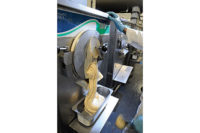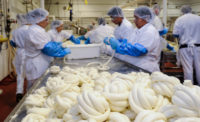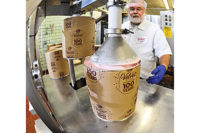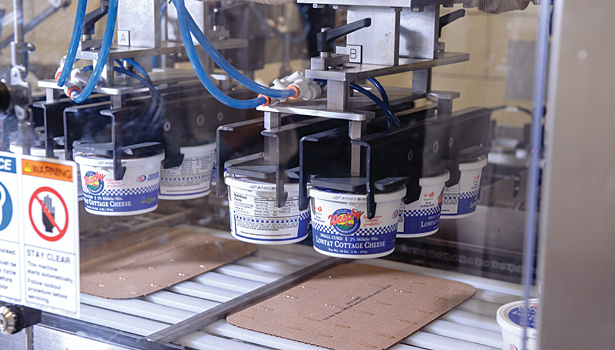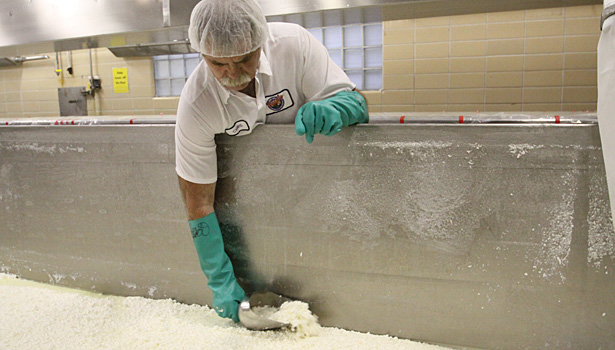A look inside Westby's plant: Cheesemakers can make a dozen different dairy products daily

Cottage cheese curds are formed.

Plant Manager Reggie Way (front row, from left) joins General Manager Pete Kondrup and Quality Compliance Manager Lawrence Dodge in a conference room in the new corporate offices attached to the distribution center. In the back row are (from left): Retail Sales Representative Kevin Gittens, Production Planner Ryan O’Donnell and Sales & Business Development Manager Mark Rutlin.

After filling, 16-ounce containers of cottage cheese are set down on a piece of corrugate and held in place with a spot of glue. A new machine cut glue costs in half.

Cheesemakers finish up a day’s production. Westby is a major producer of private-label organic cheese.

The new distribution center can accommodate more products than Westby can produce now. It will allow the co-op to grow.

In the on-site lab, raw milk is analyzed and samples from every production run are tested.

Cheesemaker Chris “Doc” Dach has worked at Westby Cooperative Creamery for 35 years.







That motto on Wisconsin license plates, “America’s Dairyland,” is truer than a lot of people realize. A small, fast-growing dairy cooperative located two hours northwest of Madison could be called “America’s Dairy Processor” because it is shipping products far from home — to customers on the East and West coasts, and even to the Caribbean Sea (where made-in-Wisconsin dairy foods are served on cruise ships).
Westby Cooperative Creamery, Westby, Wis., ships cheese products to New York for Russian immigrants and high-protein organic Icelandic-style yogurt to the West Coast. Conventional yogurt is bound for Kentucky where a food processor will add it to salad dressings and dips. The co-op also makes Greek yogurts, cottage cheeses, cream cheeses, sour creams, dairy dips, 14 varieties of hard cheeses and cheese curds. As the cooperative’s managers are fond of pointing out, the creamery is the state’s only manufacturer of cottage cheese.
Westby is a 110-year-old dairy producer and processor with 170 members (called patrons) who supply rBST-free conventional and organic milk. It has four channels of distribution: private label manufacturing, food ingredients, foodservice (schools, healthcare, restaurants and other institutional users) and retail (the Westby brand is sold in retail grocery and convenience stores).
The creamery rises behind a small retail cheese store on the city’s Main Street. About half of Westby’s revenues come from sales to private-label accounts. Its own branded Westby products are sold in Midwest grocery stores, food co-ops and convenience stores.
In 2012, Westby moved its administrative offices 1.2 miles up the road to a new building that includes a 10,000-square-foot refrigerated warehouse/distribution center and 6,000 square feet of office space. The box-shaped building won’t win any architectural prizes, but the co-op itself wins honors regularly for the quality of its dairy products. It took three First Place awards for its branded 2% low-fat small curd cottage cheese, sour cream, and French onion dip at the 2012 Wisconsin Dairy Products Association World Dairy Expo Championship Dairy Products Contest.
Pete Kondrup has been the co-op’s general manager for the last 10 years. During that time, annual revenues increased from $15 million to $50 million in 2012. Kondrup and the board of directors (led by President Loren Oldenburg) plan to continue that trajectory. The $2.3 million distribution center project was built to accommodate growth — it has plenty of storage space available.
Kondrup walked with me through the three-story refrigerated warehouse with five-high racking. He pointed out 460-pound steel drums and 2,800-pound reusable totes filled with yogurt. Some ingredient customers will use the yogurt in dips and dressings; others will spray-dry it for use in candies. Elsewhere in the warehouse, containers of dry-curd cottage cheese are bound for food processors that will use it in cheese blintzes or lasagna. Branded Westby products in retail-sized containers are stacked on pallets awaiting pick-up.
Before Westby built the warehouse/distribution center, it stored finished product behind the plant in refrigerated trailers powered by generators. The new warehouse made Westby a better neighbor overnight because truck noise is a thing of the past at the plant in downtown Westby. The trailers are gone, and delivery trucks don’t idle at the plant as they load.
The distribution center has three truck bays. The building is designed so that trucks can open their doors inside the warehouse and seal their doors before departing. Loading time has been reduced to 30 minutes from the three hours it used to take at the plant. About 10 to 15 trucks a day load up from 5 a.m. to 10 p.m. The warehouse also allows Westby to keep better track of inventory. When product was stored in trailers, it was difficult to account precisely for what was shipped and what was on hand.
Investments in the processing plant
The co-op was established in 1903 and the members at that time sent their cream to be turned into butter. The current plant was built in 1926. Over the years, cheese rooms and packaging areas were added as the co-op grew. Processing and packaging equipment have filled the creamery wall to wall. One of these days, Westby will build a new plant next to the distribution center. In the meantime, the co-op board continues to invest in new processing and packaging equipment.
Improvements in recent years include a four-lane filler with HEPA air filtration that replaced a three-lane filler dating to the mid-1950s. The new equipment has reduced the overfill of cottage cheese and sour cream cups, maximized efficiency and decreased plant downtime, said Plant Manager Reggie Way. A new secondary-packaging machine has cut glue costs in half. Westby replaced all the stainless steel piping in the processing room in the last five years. New control systems have improved blending, resulting in more consistent product.
Processing and production
The creamery can receive two milk tankers at a time. Tankers filled with conventional and organic milk arrive throughout the day from the co-op’s current 170 members. Samples are sent to the on-site lab for pathogen and component testing. The plant accepts only Grade A milk. The co-op pays bonuses to dairy farmers based on milk quality.
The processing room contains three culture tanks, two mix tanks, pasteurization equipment, a separator, a two-stage homogenizer and a powder-blending vat. Milk for cultured product undergoes vat pasteurization in a 1,000-gallon vat and milk for cheese goes through a high-temperature/short-time pasteurizer.
Since Westby implemented standard operating procedures and developed formula sheets for processing, the plant has cut down significantly on manufacturing mistakes, said Quality Compliance Manager Lawrence Dodge. Another benefit is that it has led to consistency of products.
Westby produces 300,000 pounds of conventional cheese annually, and 2 million pounds of organic cheese. Total production (including cottage cheeses, sour creams, yogurts and dips) tops 28 million pounds. A small portion of this ends up in the creamery’s retail cheese store, which sells fresh-from-the-factory dairy products (plus beverages and other food items) to local customers and tourists. Fresh cheese curds are a popular favorite.
The ability to process conventional and organic dairy products, as well as produce a variety of products, makes Westby an attractive private label and ingredients contract manufacturing partner. It is not uncommon for the co-op to produce 10 to 12 different products in one day. While that might cause scheduling headaches for Production Planner Ryan O’Donnell, the flexibility and agility to make small batches of dairy foods throughout the day helps secure these contract manufacturing accounts.
The cottage cheese production room holds five Grade A skim vats — three 35,000-pound vats, one 28,000-pound vat and one 14,000-pound vat. For finished product that needs milk powders, fluid milk flows through a flow meter and is blended in the vat. HTST milk is piped to the vats where a dry curd machine makes the cottage cheese. Then a draining conveyor drains water and whey.
Next to the processing room is the packaging room where Westby fills containers with sour cream, cottage cheese, yogurt and dips. At the timeDairy Foods visited, Westby was filling one-pound cups with 2% milk fat cottage cheese on the four-lane filler. Curds and dressing were pumped from the cottage cheese make-room to the filler. The versatile equipment is capable of filling 8-, 16-, 24- and 32-ounce containers of cottage cheese, said Plant Manager Reggie Way.
After filling, a safety seal is applied, the excess material is trimmed and an overcap is fitted on top. The containers of cottage cheese are conveyed through a metal detector, and then an ink-jet printer sprays on a code date. The secondary packaging equipment assembles the containers into 6- or 12-unit bundles.
Next to the four-lane filler, another filler was filling 6-ounce cups of yogurt for a co-packing account. This equipment can also fill 8- and 15-ounce cups. A nearby five-pound filler is used to package cultured dairy products for foodservice customers. It also can fill bag-in-box packages of sour cream, cream cheese and yogurt.
While cottage cheese production is relatively automated, hard cheese production is a decidedly hands-on operation. Westby has five licensed cheesemakers on staff. (At one time, General Manager Kondrup held a license.)
Westby’s hard cheese production facility on the top floor of the creamery has two open vats, each holding 16,000 pounds of milk. It is a small operation, but surprisingly efficient. The cheesemakers have the capability of making eight vats of cheese daily, depending on customer demand and scheduling. Twice a week the plant makes cheese curds.
The cheesemakers produce at least nine (and as many as 14) cheeses regularly, including Cheddar, Italian varieties and Gouda. They empty pails of curd into 40-pound block forms that are compressed to squeeze out whey. Then the cheese blocks are removed from the forms and then bagged and vacuum-sealed. After weighing, a sticker is applied and the blocks are held in an aging room.
A focus on food safety
The lab is run by Jason Levendoski and nine technicians. Besides testing the raw milk that is delivered daily, the lab tests samples from every production run for pathogens, organoleptic characteristics and shelf life. Westby requires Certificates-of-Analysis from its vendors. It will make random tests of fruit purees and tests every lot of vegetables.
Besides testing product, the plant itself is tested on a regular basis. Employees swab all the rooms in a four-zone testing pattern, beginning with food contact areas and moving progressively farther away. Drains are tested at least monthly. New CIP touchscreen control panels meter the cleaning chemicals and have decreased water use by 25%. The U.S. Food and Drug Administration and the Wisconsin Department of Agriculture have jurisdiction in the plant. Westby’s enforcement rating on the April 2013 Interstate Milk Shippers List improved to 92 (it was 90 in April 2011).
In July, the creamery received renewal of its SQF Code Level 3 certification (first attained in 2011) in the categories of Dairy Food Processing and Preserved Food Manufacturing. Westby management and employees committed to achieving Level 3 rather than Level 2, said Dodge, the compliance manager. To achieve the higher certification, managers got the employees to take ownership of the challenge, rather than directing them from the top down. The focus on food (and plant) safety continues. Trainers discuss best practices at regularly scheduled monthly meetings, where attendance is mandatory. Dodge said the next quality initiative will be implementing a 5-S program throughout the manufacturing plant.
An eye on the future
From 2009 to 2013, the co-op almost doubled its production of dairy products. At some point, growth will require the construction of a new plant because the current plant is maxed out. Westby has enough available acreage surrounding the administrative offices and distribution center, and it has options on 33 more acres. The warehouse/distribution center has the capacity to store more products.
Growth means the patrons either will have to increase their herd size or the cooperative will need to recruit new members, which has been happening at a steady pace in recent years. The processing arm is dependent on the growth of its private label and ingredient accounts. The creamery also will need to add new foodservice customers and further develop retail sales of the Westby brand.
It’s a long way from little Westby (population 2,200) to the big cities in the East and the West. But this 110-year-old cooperative of local family dairy farms is happy and ready to share what it calls “country goodness” with the outside world. N
At a Glance
Westby Cooperative Creamery, Westby, Wis.
Interstate Milk Shippers plant 372
Year built:1926. Latest update was 2013 (packaging equipment).
Size of plant: 40,000 square feet
Employees: 130 (plant and administrative)
Products: Hard cheeses, cheese curds, cottage cheeses, sour creams, dairy dips, cream cheeses, yogurts; conventional, organic and kosher. Retail, foodservice, private-label and ingredient accounts.
Capacity: 30 million pounds annually
Silos: Four, 750,000 pounds total capacity
Pasteurization: High-temperature/short-time and vat pasteurization
Fillers: 5 lines, ranging from 6-ounce yogurt cups to 55-gallon drums
Warehouse: 10,000 square feet (connected to 6,000-square-foot office), completed in 2012. 1,000 pallet positions, 3 bays
Photos by Jeff Ellis Photography
Looking for a reprint of this article?
From high-res PDFs to custom plaques, order your copy today!




